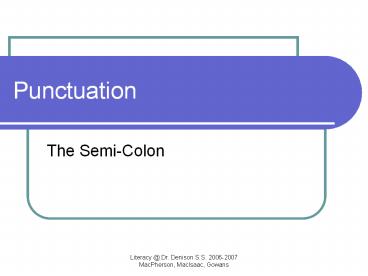Punctuation - PowerPoint PPT Presentation
1 / 9
Title:
Punctuation
Description:
Punctuation The Semi-Colon Simple Sentences The Independent Clause Sentence Combining What if we try to combine these ideas by using a comma? How do we fix the comma ... – PowerPoint PPT presentation
Number of Views:248
Avg rating:3.0/5.0
Title: Punctuation
1
Punctuation
- The Semi-Colon
2
Simple Sentences
- Now, lets expand on that idea a little bit.
- Lets begin with a simple sentence.
- Heather comes late to class.
- She will have to face the consequences.
3
The Independent Clause
- Heather comes late to class.
- She will have to face the consequences.
- This is OK. These are two independent ideas
(independent clauses), separated by a period.
4
Sentence Combining
- What if we try to combine these ideas by using a
comma?
,
Heather is late for class
she will have to face the consequences.
Somethings wrong. We connected two independent
clauses with only a comma.
The dreaded COMMA SPLICE!
5
How do we fix the comma splice?
6
Using a Coordinating Conjunction
coordinating
conjunction.
- We could insert a
Because Heather comes late to class, she will
have to face the consequences.
This is better. Note the comma that accompanies
the coordinating conjunction.
7
Using a Subordinating Conjunction
subordinating
conjunction.
- We could insert a
Heather comes late to class so she will have to
face the consequences.
Notice here that the comma is gone. The word
so subordinates the second clause, making it a
dependent clause.
8
Using the semi-colon
- We could make use of the semi-colon to join two
independent clauses.
- Heather comes late to class she will have to
face the consequences.
- Notice that there is NO conjunction
(subordinating or coordinating) used in this
sentence, just the semi-colon.
9
Conjunctive adverbs and semi-colons
- Sometimes semicolons are accompanied by
conjunctive adverbs words such as however,
moreover, therefore, nevertheless, consequently,
as a result.
- Heather comes late to class
- as a result,
she will have to face the consequences.
Notice the pattern semi-colon conjunctive
adverb- comma































